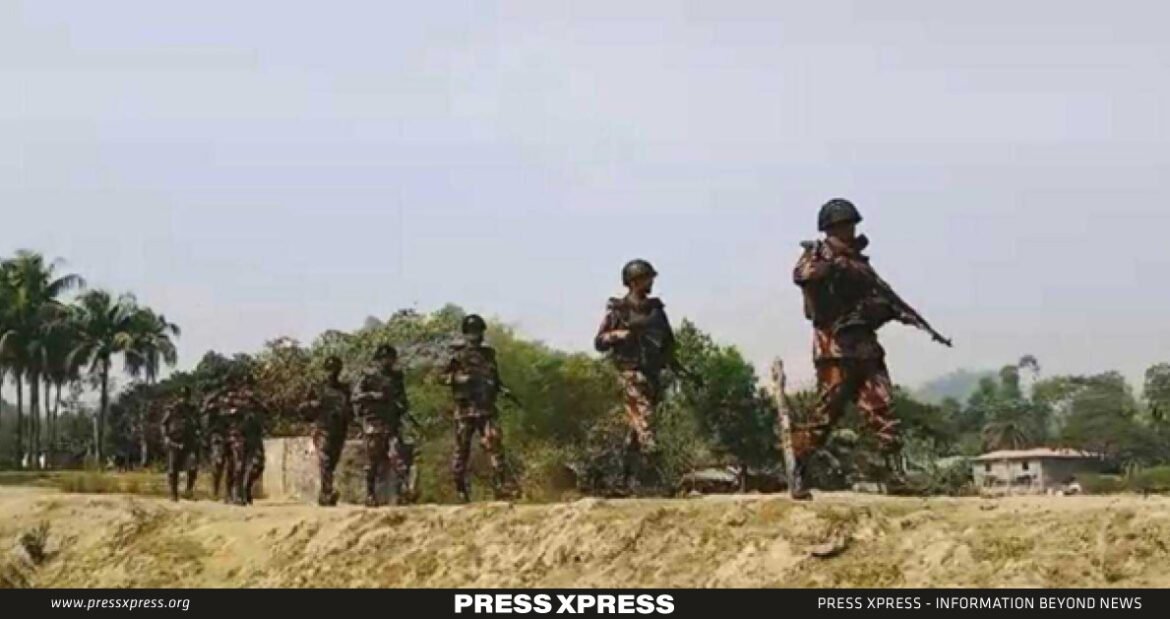Tensions are mounting in the vicinity of Teknaf, causing concern among the Parliamentary Committee. The escalating conflict between Myanmar’s military and the Arakan Army in Rakhine State is having a profound impact on the border regions of Bangladesh. Mortar shells have crossed the border and landed in Bangladeshi territory, and civilians are being displaced as a result of the ongoing violence.
You Can Also Read: BANGLADESH TARGETS KUKI REBELS FOR PEACE IN HILLS
The conflict is taking a heavy toll on Teknaf’s economy and its residents. Trade through the port has significantly decreased, while civilians fleeing the fighting are creating a humanitarian crisis.
The Parliamentary Committee is raising the alarm, calling for diplomatic efforts to help resolve the conflict and ensure the safety of those affected. International support is crucial in bringing stability to the region and preventing further escalation.
Background
The ongoing conflict between Myanmar’s military and the Arakan Army in Rakhine State is at the heart of the situation in Teknaf. As the conflict has escalated, it has had a profound impact on the border area, with the effects spilling over into Teknaf.

This conflict has given rise to significant humanitarian and economic challenges. In Rakhine State, clashes and military operations have led to destruction, displacement, and loss of life. The consequences of the situation have been felt on both sides of the border, with residents of Teknaf reporting increased panic and economic disruption.
Economic Impact on Teknaf
Trade at the Teknaf land port has seen a sharp decline in recent months, with both imports and exports falling significantly. The primary reason for this downturn is the ongoing conflict in Myanmar’s Rakhine State, which has caused disruptions near the border and led to a decrease in trade volume.
One notable example of the impact on trade is the cessation of trade from Myanmar via Teknaf, which has had a detrimental effect on the local economy. Furthermore, the region is grappling with persistent smuggling activities with Rohingya camps being used as transit points.
The parliamentary committee has called attention to the dire situation, emphasizing that the economic downturn, along with the humanitarian crisis, requires urgent intervention. To ensure the region’s stability, it is crucial to resolve the conflict, reopen trade routes, and address the smuggling activities.
Border Security Concerns
The intensification of the conflict in Myanmar’s Rakhine State has raised significant concerns about border security in the vicinity of Teknaf. The situation has escalated to the point where mortar shells have landed on Bangladeshi soil, prompting authorities to enhance security measures. Additionally, the conflict has resulted in violations of airspace, further heightening the sense of alarm in the region.
Residents living near the border are growing increasingly worried as the sounds of explosions and gunfire from Myanmar continue to be heard, intensifying the feeling of insecurity. The Parliamentary Committee has stressed the importance of implementing diplomatic measures to ensure the safety of citizens and bring stability to the area.

Moreover, smuggling activities continue to be a problem, with Rohingya camps serving as transit points for the illegal trafficking of goods such as drugs, gold, and other items. Despite border security forces ramping up their efforts to combat smuggling, the ongoing conflict presents additional challenges to their work.
International Response
The escalating conflict in Myanmar’s Rakhine State has caught the attention of the international community, with concerns reaching as far as Teknaf. The United Nations has called for action, stressing the need for humanitarian aid and intervention to prevent further persecution. This sentiment has been echoed by other international organizations, which have emphasized the importance of protecting all civilians in the region.
International efforts, such as diplomatic initiatives and aid programs, are aimed at addressing the humanitarian crisis and providing relief to displaced civilians. These interventions are crucial for stabilizing the region, reopening trade routes, and ensuring the safety of the affected population.
Recommendations
The Teknaf situation demands comprehensive solutions from the Bangladeshi government. The following recommendations can help mitigate the situation:
- Diplomatic Engagement: Intensify diplomatic efforts with Myanmar to de-escalate tensions and resolve the conflict in Rakhine State. This would help stabilize the border and prevent further humanitarian crises.
- Humanitarian Assistance: Collaborate with international organizations to provide aid to displaced civilians on both sides of the border. This includes food, shelter, and medical assistance, particularly in light of the destruction of medical facilities in Rakhine State.
- Strengthening Security: Enhance border security measures to prevent further airspace violations and mortar shelling incidents. This will help protect civilians and prevent cross-border tensions.
- Combat Smuggling: Increase law enforcement presence along the border to tackle smuggling activities, particularly those using Rohingya camps as transit points.
- Reopen Trade Routes: Work towards reopening and stabilizing trade routes through Teknaf port. This would help revive the region’s economy and ensure the steady flow of goods across the border.
By addressing these key areas, the Bangladeshi government can work towards stabilizing Teknaf and supporting its citizens.
Conclusion
The conflict in Myanmar’s Rakhine State has led to crises in Teknaf, causing humanitarian and economic issues. Cross-border tensions have risen, with mortar shelling and airspace violations. This has disrupted trade at the Teknaf port. The Parliamentary Committee urges diplomatic intervention for civilian safety and regional stability. International bodies like the UN stress the need for humanitarian aid and conflict resolution to prevent escalation. Diplomatic efforts and aid are vital for de-escalation, border protection, and economic recovery.


